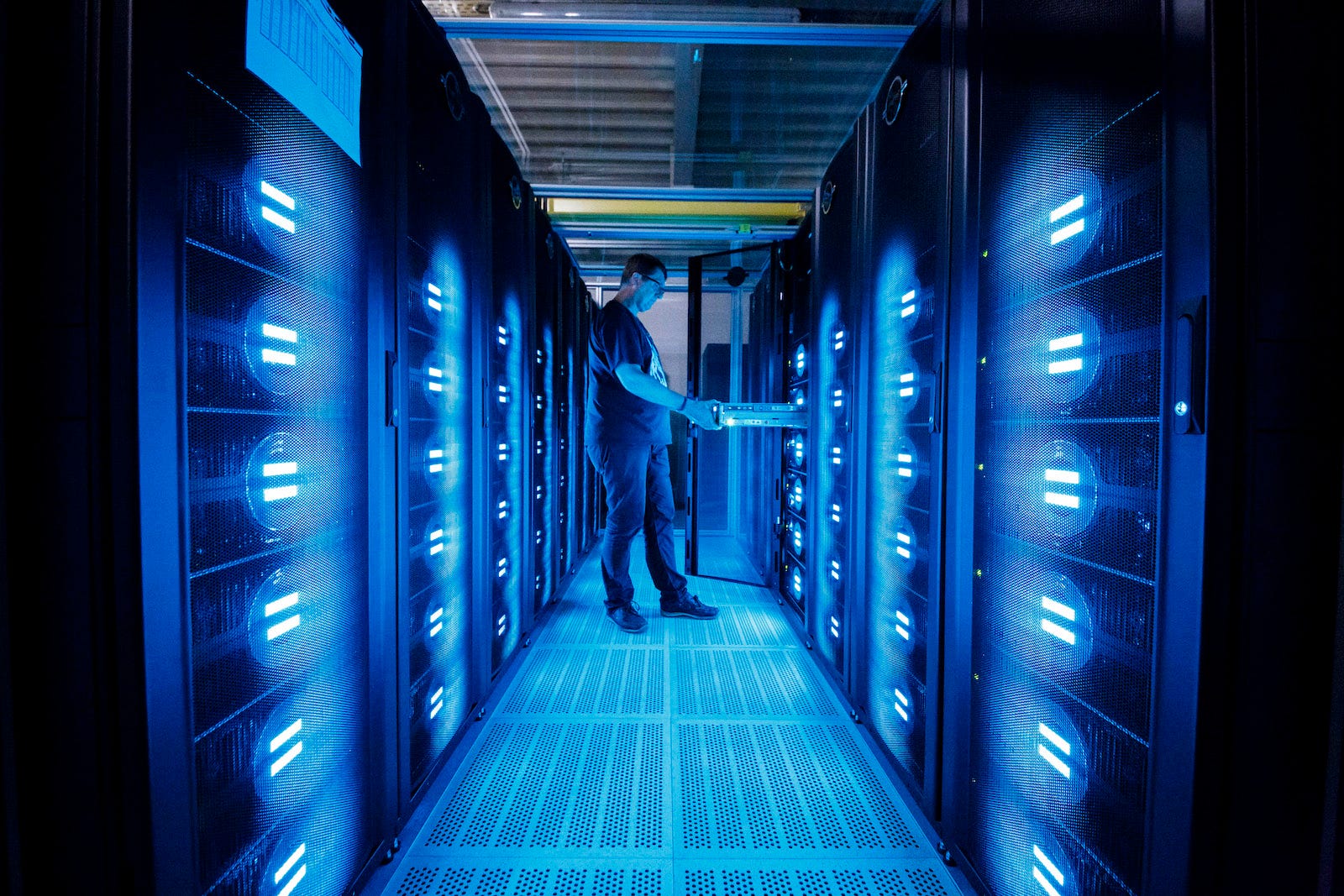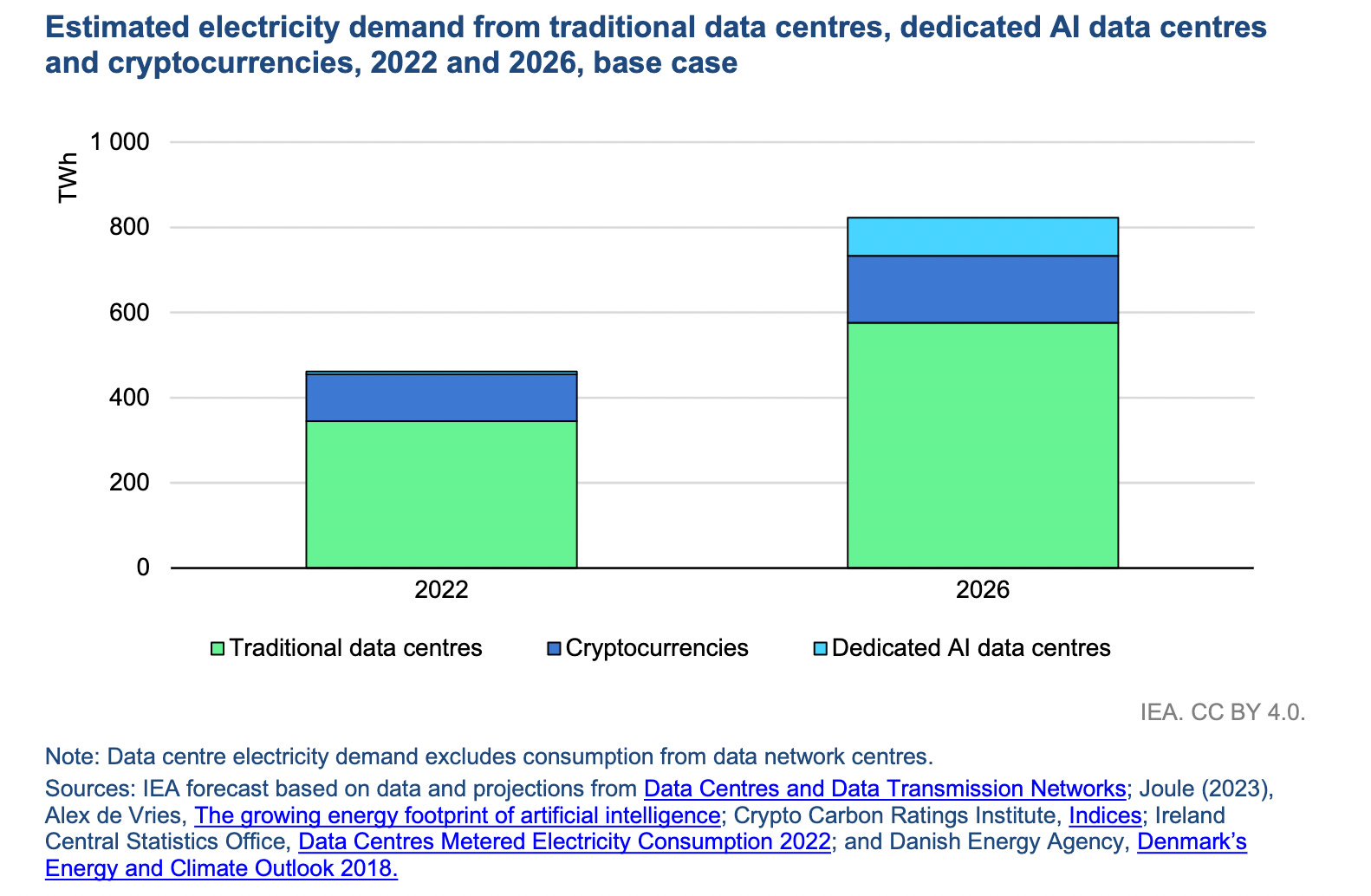Are your internet habits killing the planet?
Are your internet habits killing the planet?The internet is quickly becoming a major contributor to climate change. Here's how to understand the problem—and what can be done to fix it.This weekend I binged Bridgerton, Netflix’s raunchy, Regency-ish romcom. Along with 45 million other people, I tuned in to find out if incisive, socially-awkward gossip columnist Penelope Featherington could win the heart of her lovable, pirate cosplaying neighbor. But as I was watching, I had a nagging feeling. Because lately, I've been reading a lot about how the internet contributes to the climate crisis. And I've learned that the web pollutes more than I ever would have guessed. Everything we do online has an environmental impact, just like the clothes we buy, the food we eat, and the way we travel. But unlike fashion, burgers, and cars, you can’t touch the internet: it seems to exist in an abstract, disembodied place beyond the physical world. But the internet is physical. It exists in fiber optic cables, cell towers, transformers, and especially data centers: huge concrete buildings housing tens of thousands of computer servers cooled by trillions of liters of water. And data centers require a constant supply of electricity. To watch Bridgerton, for example, I have to stream Netflix, which is hosted on the Amazon Web Services cloud. AWS is stored on more than 50,000 servers in data centers around the world. Those servers run on energy predominantly supplied by burning fossil fuels. Because of this, the internet’s contribution to climate change already sizable. The Royal Society estimates that digital technologies—our gadgets, the internet and the systems supporting them—are responsible for anywhere from 1.4 to 5.9 percent of global greenhouse gas emissions. The scientific academy admits that it’s “an intricate challenge“ to find an exact number, but the estimate puts our web habits on par with the aviation industry. And at least one expert I spoke with said she thinks those estimates are too low. In the future, the industry’s emissions are expected to grow rapidly, especially as AI becomes more advanced. The IEA estimates that electricity consumption from data centers, AI, and the cryptocurrency sector could double by 2026, consuming as much energy as Japan. So that made me wonder: Should I be using the internet less? Are Colin Bridgerton and Penelope Featherington really so hot that they’re about to push our climate beyond the brink of livability? I asked Michael Khoo, climate disinformation program director at the nonprofit Friends of the Earth, and author of a recent report on artificial intelligence. And fortunately, he explained that the internet’s biggest climate problem is not individual internet users. It’s a tech industry committed to the endless expansion of its offerings—particularly artificial intelligence—while shrugging off responsibility for the consequences. How much internet is too much?The web isn’t entirely a climate villain. In some ways, it’s a climate hero. “There are a ton of great things that happen on the internet, including research on climate change and communications between scientists,” Khoo told me. The internet makes it possible to work remotely and commute less; to accurately predict natural disasters; to monitor water quality and deforestation via wireless sensors; and even to build the climate models used in the IPCC reports. So unlike fossil fuels, the internet is not a product that needs to be phased out to preserve a livable climate. It’s just a product that needs to be used more wisely. Some uses of the internet, for example, pollute very little compared to others. A Google search emits about 0.2 grams of carbon dioxide. Every minute spent on TikTok emits about 2.6 grams. Watching one hour of video emits about 36 grams. But those activities are nothing compared to artificial intelligence and cryptocurrency, which are largely responsible for the recent boom in emissions. Take Google’s newest search feature: AI-generated answers from its bot Gemini. An AI-assisted search requires 10 times more power than a traditional search, Khoo tells me. And each new generation of generative AI requires more energy. Training ChatGPT-3 consumed 1,287 megawatt hours of electricity and generated 552 tons of CO2—the equivalent of 123 gasoline-powered passenger vehicles driven for one year. Training ChatGPT-4 used approximately 40 times more energy than ChatGPT-3. Mining for bitcoins uses 145 million megawatt-hours of electricity a year, more than the Netherlands. One MIT study found that the cloud—a network of remote servers that store and manage data—has a larger carbon footprint than the airline industry. These numbers are only expected to grow, particularly because the more people use these technologies, the more they emit. For example, the act of asking GPT-4 a question is called inference, and some research shows that inference can consume more energy than training. An October 2023 study from the VU Amsterdam School of Business reported that AI servers could be using as much energy as Sweden by 2027. These figures, however, are just estimates. The real climate impact of AI is still unknown, said Sasha Luccioni, climate lead at AI company Hugging Face, because tech companies don’t release any data on how much power products like ChatGPT require. “We don't know how much energy it's using. So we don't know what the environmental effect is,” said Luccioni. The lack of transparency is “very frustrating,” she said. Demand for AI is prolonging coal and fueling gasIn the meantime, while researchers scramble to figure out just how bad AI and cryptocurrency is for the climate, electric utilities have nearly doubled their forecasts for how much power they’ll need in the next four years. Data centers are driving this demand, along with increased American manufacturing, and, ironically, electric vehicles. Many states say they can’t meet that data center demand with their current capacity. Utilities in Georgia, North Carolina, South Carolina, Tennessee, and Virginia are prolonging the life of coal plants and planning to build dozens of methane gas plants to supply enough power, according to The New York Times. This power plant build out is “game over for the Biden administration’s 2035 decarbonization goal,” one former solar developer told the Times. Not all the electricity flowing to data centers is powered by fossil fuels. The companies behind the rapid growth—Amazon, Google, Meta, Apple, and Microsoft—have made significant investments in renewable energy. Together, these five companies are responsible for over half of the global corporate renewables market, according to S&P Global. But even OpenAI CEO Sam Altman admitted growing AI demands can’t be met by the current amount of nuclear and renewable energy sources. “There’s no way to get there without a breakthrough,” said Altman, according to Reuters. Khoo called the idea that AI is good for the planet “PR greenwashing spin.” There’s not enough renewable energy in the U.S. to power all of the data centers that exist now, let alone the data centers approved for construction. In the next two years, data centers will make up more than one-third of additional U.S. electricity demand. The clean AI message is a particularly sneaky greenwashing tactic because the fossil fuel industry is one of the biggest purchasers of AI products. Ninety-two percent of oil and gas companies will use AI to extract oil in the next five years, reports Friends of the Earth. Exxon already uses AI in deep-water drilling and the Permian Basin. Microsoft employees resigned last year over the company’s deals with the fossil fuel industry, which promised to increase oil production and drive up profits, according to Grist. Additionally, building these AI models is so expensive that tech companies like OpenAI are turning to petrostates like the United Arab Emirates and Saudi Arabia to fund the expansion of their AI models. So while Sam Altman and other artificial intelligence advocates argue that AI can actually help with climate change, and make data centers more efficient, Khoo says the bad overshadows the good. “AI for good is a tiny little pebble under your foot,” he said. “AI for bad is a skyscraper.” In sum: if you want to stream Bridgerton all day, you’re probably not significantly contributing to planetary catastrophe. But if you want to build an AI chatbot to talk to you exclusively in Colin Bridgerton’s voice, that’s another story entirely. Solutions for a high-polluting internetIndividual behavior changes alone won’t solve the problem of a high-polluting internet. Ultimately, what’s needed is systemic change from tech companies and fossil fuel companies—and that change must be demanded by individuals.
And like every climate problem, there is still power in individual choice. The authors of one peer-reviewed study found that changing social norms is just as important to mitigating climate change as the energy transition. So if you want to be a part of changing social norms around AI, there is a way to do that, too. “You don't need to be like buying all the generative AI products that people are selling,” said Luccioni. “You don't need to buy the latest fridge that has a webcam that you can use to check what you have in your fridge.” Luccioni suggests that people who want to make greener choices can just use less AI altogether. Using AI instead of simpler technology “will use like 30 times more energy for the exact same output,” she said. "Sometimes I talk to people and they’re like ‘I don't use a calculator anymore, I use ChatGPT.’ And that's wrong on several levels.” And if you’re looking to be inspired by how organizers can create powerful change: My next story is about how a group of ordinary people in my home state of Virginia have banded together to hold the data center industry accountable. Don't let billionaire-controlled social media algorithms decide what climate stories you see and don’t see. Get 100 percent independent climate news delivered directly to your inbox by becoming a free or paid subscriber today. Further reading:
Catch of the day: Don’t let this face fool you—Reader Marly says Pease is pro-public transportation. We are too, though we’ve never had anything as cool as a metro chew toy. Want to see your furry (or non-furry!) friend in HEATED? It might take a little while, but we WILL get to yours eventually! Just send a picture and some words to catchoftheday@heated.world. You're currently a free subscriber to HEATED. For the full experience, upgrade your subscription. |
Older messages
Democrats ask DOJ to investigate Big Oil
Wednesday, May 22, 2024
Here's what to know, and why it's important. ͏ ͏ ͏ ͏ ͏ ͏ ͏ ͏ ͏ ͏ ͏ ͏ ͏ ͏ ͏ ͏ ͏ ͏ ͏ ͏ ͏ ͏ ͏ ͏ ͏ ͏ ͏ ͏ ͏ ͏ ͏ ͏ ͏ ͏ ͏ ͏ ͏ ͏ ͏ ͏ ͏ ͏ ͏ ͏ ͏ ͏ ͏ ͏ ͏ ͏ ͏ ͏ ͏ ͏ ͏ ͏ ͏ ͏ ͏ ͏ ͏ ͏ ͏ ͏ ͏ ͏ ͏ ͏ ͏ ͏ ͏ ͏ ͏ ͏
The chopped steak eaters
Tuesday, May 21, 2024
The people who profit from climate destruction have names and faces. Last month, they all ate chopped steak. ͏ ͏ ͏ ͏ ͏ ͏ ͏ ͏ ͏ ͏ ͏ ͏ ͏ ͏ ͏ ͏ ͏ ͏ ͏ ͏ ͏ ͏ ͏ ͏ ͏ ͏ ͏ ͏ ͏ ͏ ͏ ͏ ͏ ͏ ͏ ͏ ͏ ͏ ͏ ͏ ͏ ͏ ͏ ͏ ͏ ͏
Don’t fall for “climate-friendly” beef
Tuesday, May 14, 2024
New FOIA documents give insight into the secretive, industry-funded science behind the much-hyped product. ͏ ͏ ͏ ͏ ͏ ͏ ͏ ͏ ͏ ͏ ͏ ͏ ͏ ͏ ͏ ͏ ͏ ͏ ͏ ͏ ͏ ͏ ͏ ͏ ͏ ͏ ͏ ͏ ͏ ͏ ͏ ͏ ͏ ͏ ͏ ͏ ͏ ͏ ͏ ͏ ͏ ͏ ͏ ͏ ͏ ͏ ͏
Igniting a spark
Tuesday, May 7, 2024
How HEATED's journalism continues to move the needle. ͏ ͏ ͏ ͏ ͏ ͏ ͏ ͏ ͏ ͏ ͏ ͏ ͏ ͏ ͏ ͏ ͏ ͏ ͏ ͏ ͏ ͏ ͏ ͏ ͏ ͏ ͏ ͏ ͏ ͏ ͏ ͏ ͏ ͏ ͏ ͏ ͏ ͏ ͏ ͏ ͏ ͏ ͏ ͏ ͏ ͏ ͏ ͏ ͏ ͏ ͏ ͏ ͏ ͏ ͏ ͏ ͏ ͏ ͏ ͏ ͏ ͏ ͏ ͏ ͏ ͏ ͏ ͏ ͏ ͏ ͏ ͏
GOP Senator accidentally creates amazing ad for climate activists
Thursday, May 2, 2024
Senator John Kennedy's profanity-laden rant at Wednesday's Senate hearing is now being used against him. ͏ ͏ ͏ ͏ ͏ ͏ ͏ ͏ ͏ ͏ ͏ ͏ ͏ ͏ ͏ ͏ ͏ ͏ ͏ ͏ ͏ ͏ ͏ ͏ ͏ ͏ ͏ ͏ ͏ ͏ ͏ ͏ ͏ ͏ ͏ ͏ ͏ ͏ ͏ ͏ ͏ ͏ ͏ ͏
You Might Also Like
David Beckham's Lifestyle Keeps Him Shredded at 50
Friday, February 28, 2025
View in Browser Men's Health SHOP MVP EXCLUSIVES SUBSCRIBE David Beckham's Lifestyle Keeps Him Shredded at 50 David Beckham's Lifestyle Keeps Him Shredded at 50 The soccer legend opens up
7 Home Upgrades That Require Zero Tools
Friday, February 28, 2025
Skype Is Dead. There are plenty of ways to make quick improvements to your house without a single hammer or screwdriver. Not displaying correctly? View this newsletter online. TODAY'S FEATURED
Heidi Klum Matched Her Red Thong To Her Shoes Like A Total Pro
Friday, February 28, 2025
Plus, the benefits of "brain flossing," your daily horoscope, and more. Feb. 28, 2025 Bustle Daily Here's every zodiac sign's horoscope for March 2025. ASTROLOGY Here's Your March
How Trans Teens Are Dealing With Trump 2.0, in Their Words
Friday, February 28, 2025
Today in style, self, culture, and power. The Cut February 28, 2025 POWER How Trans Teens Are Dealing With Trump 2.0, in Their Words “Being called your correct name and pronouns can be the difference
The Eater Oscars for best bites in film this year
Friday, February 28, 2025
An NYC cafe garners celebrity support after rent hike
The Must-See Movies The Oscars Overlooked
Friday, February 28, 2025
Plus: Celebrities pay tribute to Michelle Trachtenberg. • Feb. 28, 2025 Up Next Your complete guide to industry-shaping entertainment news, exclusive interviews with A-list celebs, and what you should
The Best Cropped Jackets for Spring, Styled by Us
Friday, February 28, 2025
Plus: What we carried in our bags at Fashion Week. The Cut Shop February 28, 2025 Every product is independently selected by our editors. Things you buy through our links may earn us a commission.
The chicken and the eggs
Friday, February 28, 2025
and where they both come from ͏ ͏ ͏ ͏ ͏ ͏ ͏ ͏ ͏ ͏ ͏ ͏ ͏ ͏ ͏ ͏ ͏ ͏ ͏ ͏ ͏ ͏ ͏ ͏ ͏ ͏ ͏ ͏ ͏ ͏ ͏ ͏ ͏ ͏ ͏ ͏ ͏ ͏ ͏ ͏ ͏ ͏ ͏ ͏ ͏ ͏ ͏ ͏ ͏ ͏ ͏ ͏ ͏ ͏ ͏ ͏ ͏ ͏ ͏ ͏ ͏ ͏ ͏ ͏ ͏ ͏ ͏ ͏ ͏ ͏ ͏ ͏ ͏ ͏ ͏ ͏ ͏ ͏ ͏ ͏ ͏ ͏ ͏ ͏ ͏ ͏
March's Guest Editor: Kim Addonizio
Friday, February 28, 2025
Thank you for supporting Poem-a-Day ͏ ͏ ͏ ͏ ͏ ͏ ͏ ͏ ͏ ͏ ͏ ͏ ͏ ͏ ͏ ͏ ͏ ͏ ͏ ͏ ͏ ͏ ͏ ͏ ͏ ͏ ͏ ͏ ͏ ͏ ͏ ͏ ͏ ͏ ͏ ͏ ͏ ͏ ͏ ͏ ͏ ͏
New and Old #203
Friday, February 28, 2025
Friday roundup and commentary ͏ ͏ ͏ ͏ ͏ ͏ ͏ ͏ ͏ ͏ ͏ ͏ ͏ ͏ ͏ ͏ ͏ ͏ ͏ ͏ ͏ ͏ ͏ ͏ ͏ ͏ ͏ ͏ ͏ ͏ ͏ ͏ ͏ ͏ ͏ ͏ ͏ ͏ ͏ ͏ ͏ ͏ ͏ ͏ ͏ ͏ ͏ ͏ ͏ ͏ ͏ ͏ ͏ ͏ ͏ ͏ ͏ ͏ ͏ ͏ ͏ ͏ ͏ ͏ ͏ ͏ ͏ ͏ ͏ ͏ ͏ ͏ ͏ ͏ ͏ ͏ ͏ ͏ ͏ ͏ ͏ ͏ ͏ ͏ ͏ ͏





